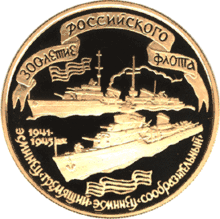Soviet destroyer Gremyashchiy (1937)
| Gremyashchiy as depicted on a 1982 postage stamp. | |
| History | |
|---|---|
| Name: | Gremyashchiy |
| Builder: | Plant 140, Zhdanov (Leningrad) |
| Laid down: | 23 July 1936 |
| Launched: | 12 August 1937 |
| Commissioned: | 28 August 1939 |
| Decommissioned: | 1958 |
| General characteristics | |
| Class and type: | Gnevny-class destroyer |
| Displacement: |
|
| Length: | 112.8 m (370 ft 1 in) |
| Beam: | 10.2 m (33 ft 6 in) |
| Draught: | 4.8 m (15 ft 9 in) |
| Propulsion: |
|
| Speed: | 38 knots (70 km/h; 44 mph) |
| Endurance: |
|
| Complement: | 246 |
| Sensors and processing systems: | Arktur hydrophone |
| Armament: |
|
| Service record | |
| Operations: | |

Gremyashchiy (Russian: Гремящий; "thunderous") was a Gnevny-class destroyer in service within the Soviet Navy launched on 12 March 1937 at the Zhdanov Yard in Leningrad. Construction began on 23 July 1936, and the destroyer began operations within the Baltic Fleet on 28 August 1939, while later being transferred to the Soviet Northern Fleet in 1941.[1][2][3]
Service history
During the Winter War between the Soviet Union and Finland, Gremyashchiy was assigned to performing patrol duties and escorting transport ships, and did not participate in any battles.
Following the entry of the Soviet Union into World War II, she was moved to Vaenga by order of the commander of the fleet, and began her first patrols on 24 June 1941, escorting the transport ships Mossovet and Tsiolkovskiy from Murmansk to Titovka. On 22 August 1941, alongside destroyers Uritsky, Kuibyshev and Gromkiy, Gremyashchiy protected the damaged depot ship Maria Ulyanova after she was hit by a torpedo attack from a German submarine. At the same time, Gremyashchiy repelled a German air attack, shooting down one aircraft in the process.
During the evening of 24 and 25 November 1941, she fired eighty-nine 130 mm (5.1 in) shells at the Norwegian port of Vardø, alongside destroyer Gromkiy and the British cruiser HMS Kenya. From 24 to 28 January 1942, she participated in escorting Convoy QP 6, and was held for repairs for the 15 days following 5 February 1942. On 21 February 1942, she shelled enemy positions from Ara on the Kola Peninsula near the Barents Sea. Later in March, she took part in escorting convoys QP 8 and PQ 12. While escorting Convoy QP 9 on 22 March 1942, a severe storm damaged the upper deck, boiler casing and drinking water pipeline of the ship.
On 29 March, Gremyashchiy and destroyer Sokrushitel'nyy were escorting Convoy PQ 13 when they came under fire from German destroyer Z26, and opened fire in retaliation; Sokrushitel'nyy was able to damage the boiler room of Z26, however due to poor visibility the German destroyer was able to escape.[4] Later, German destroyers Z24 and Z25 began attacking British ships, however were fired upon by HMS Trinidad, Gremyashchiy and Sokrushitel'nyy, and eventually were sunk.[5]
On 30 March 1942 Gremyashchiy detected an unidentified enemy submarine and released twelve depth charges.[6] During April 1942, she was involved with escorting convoys QP 10, PQ 14 and QP 11. On 30 April, she accompanied the damaged HMS Edinburgh, however was forced to return to base on 1 May due to a lack of fuel. She attempted to return to HMS Edinburgh on 2 May after being re-supplied, however by then Edinburgh had already sunk. On 5–6 May, she participated in escorting Convoy PQ 15.
On 8 May 1942, Gremyashchiy provided fire support for troop landings at Cape Pikshuev, and on 23 August, accompanied a detachment of warships at Kola Bay alongside Sokrushitel'nyy. Between 25 and 27 August, she escorted the transport ship Dixon to Belushya Guba. Later during 17–20 September, she participated in Convoy PQ 18. She was then held for repairs from 16 January 1943 to 29 April 1943.
In 1943 she took part in 18 escort missions within the Arctic Sea region. On 12 October 1943, the cargo ship Marina Raskova lost steering control as a result of stormy weather, and was towed by Gremyashchiy. On 29 October, Gremyashchiy was struck by the anchor of transport ship Kanin and required emergency repairs.[6] During 8–12 November, she participated in escorting Convoy BC 21, and later stood for repairs between 19 November 1943 and January 15, 1944.
During 21–22 January, Gremyashchiy took part in an unsuccessful interception mission against an enemy convoy near Makkur. From 27 January to 3 October, she took part in 17 escort missions. On 9 October, Gremyashchiy and Gromkiy provided support for a troop landing operation, and on the 10th and 11th the same month shelled German troop positions at the river near Titovka. After a series of seven escort missions between 16 October and 8 December, Gremyashchiy was placed on the overhaul at Molotovsk Factory No.402 on 14 December 1944.
References
- ↑ Николаев Б. Д., Петрухин П. А. Мы с «Гремящего» — М.: Воениздат, 1961. — 192 с.
- ↑ А. Н. Соколов. Расходный материал советского флота. Миноносцы СССР и России. Военная книга 2007.
- ↑ «Гремящий»
- ↑ Энциклопедия советских надводных кораблей 1941—1945. Платонов А. В. Полигон. 2002.
- ↑ Полярные конвои: пер. с англ. А. Г. Больных-М. ООО «Издательство АСТ». стр. 67.
- 1 2 Энциклопедия советских надводных кораблей 1941—1945. Платонов А. В. Полигон. 2002. стр. 183.
External links
| Wikimedia Commons has media related to Gremyashchiy class destroyer. |